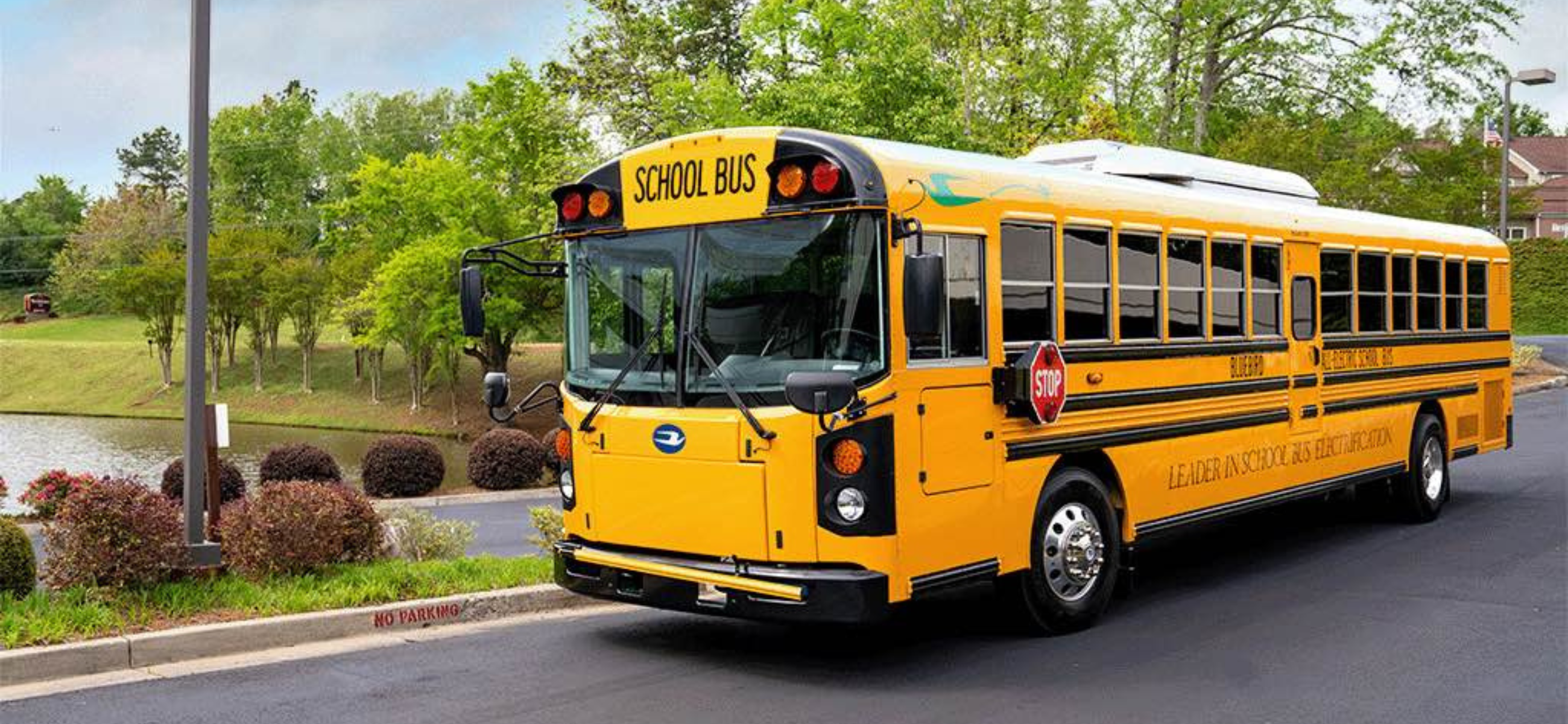Stay ahead of the curve as a political insider with deep policy analysis, daily briefings and policy-shaping tools.
Request a DemoNew yellow buses could be rolling through the streets this fall, and schools are ecstatic

(Credit: Blue Bird Corp)
This story is part of an ongoing investigation that looks at the state’s aging school buses and bus driver shortages — a combination that is having a significant impact on the education of Georgia’s youth.

The Gist
As the General Assembly prepares to put its stamp on the fiscal year 2025 budget proposed by Gov. Brian Kemp, school transportation officials and education advocates are praising, some a bit warily, the governor’s large and long-awaited increase to student transportation funding.
What’s happening
Two decades of continuous disinvestment by the state in the cost of transporting students to and from school has left many school districts with aging bus fleets and insufficient funds to hire and retain bus drivers.
Following a series of State Affairs stories charting the plight of children stuck with poor transportation, Kemp proposed in late January doubling the state’s share of the student transportation budget in 2025 with an additional $210 million for busing operations and $20 million for 227 new buses.
“It’s huge, extremely huge,” said Pat Schofill, assistant superintendent of operations for Jackson County Schools, who was director of pupil transportation for the state Department of Education from 2016 to 2022.
“What these funds are going to do for a growing system like Jackson County is significant,” he said. “Where we’re now getting $1 million for pupil transportation, the state will provide maybe $2 million of our $11 million budget. This will allow us to invest in salaries for bus drivers and technicians, training initiatives and upgrades to buses like GPS technologies, seat belts and other safety features.”
Better yet, Schofill said, the extra state funds “will allow us and many other districts to offset some of our local funds on initiatives we’ve been trying to work on,” such as building new schools and hiring more teachers and mental health counselors.

“When we heard the numbers they were tossing around, we were excited,” said Jason Ayers, transportation director for Barrow County Schools. “But we know we have to wait and see what the actual allocation looks like.”
Still, Ayers and his team are already looking at hiring more staff and increasing pay for bus drivers and bus mechanics, who both start at about $16 an hour, hoping that more competitive salaries will help to fill some long-standing vacancies.
“The reason you don’t have anybody applying for transportation departments is because they can go other places and make more money,” he said. “Anything that moves the needle on helping us to compete with trucking companies and bigger school districts is a big deal.”
Ayers said about 60 buses in his fleet of 200 are 15 or more years old, the age when most buses are considered beyond their useful life. With new buses costing about $120,000 each, “you make that bus last as long as you can. But then there comes the point where it’s just so old it’s not even practical to fix it anymore. We’ve got a lot of ground to gain with upgrading our fleet. This new funding will allow us to invest in infrastructure and operations across the board.”
Richmond County school bus driver Yolanda Brown told State Affairs last year that buses are plagued with mechanical problems and regularly break down, causing students to arrive late to school. Some miss out on breakfast as well as their first-period classes.
Brown said the problems still exist and the district still has 40 vacancies among its 176 driver positions, and many drivers have to do double routes on crowded buses. “Frustrations are running high” among drivers, students and parents, she said.
But Brown, who is president of the Transport Workers Union Local 239 of the AFL-CIO in Augusta, said she’s cautiously optimistic about the influx of new funding the governor has proposed.
“It’s a good thing he’s doing,” she said. “I’m a little concerned about how the funds will reach the local level, but I think it will filter down.” She said the district’s chief financial officer and superintendent “are finally looking at revamping employee pay,” which for bus drivers starts at $14.06 an hour. “Hopefully that will slow down the constant turnover we have.”
Paul Abbott, senior director of transportation for Richmond County schools, is more positive about the future.
“It’s going to be a boon for us,” he said. “We don’t know the dollar amount yet and exactly what it will allow us to do, but we’re planning to give a nice bump on starting pay, which is what we’ve needed to get people in the door.”
Why it matters
Until the mid-1990s, the state, which by law is required to support the cost of transporting kids to public schools, covered about half of school districts’ total cost for student transportation. But over the years, Georgia’s investment has steadily dropped — amounting to about 17% of the total $1.1 billion cost in 2023.
This drop has put a strain on many school districts, which have had to cut other educational expenditures to keep bus operations going. And many districts have not been able to find enough funds to maintain bus fleets adequately and pay personnel a livable wage. Many career bus drivers and mechanics have quit or retired, and schools are finding them hard to replace.
Kemp’s proposed fiscal year 2025 budget would cover about 31% of school districts’ total costs for transportation. And instead of a one-time grant, Kemp’s move to put transportation funds in the education formula funding part of the budget signals “that schools can count on this level of funding every single year,” said Stephen Owens, education director at the Georgia Budget & Policy Institute.
“This will do real good in schools, to have these funds baked into the budget,” Owens said. “If the General Assembly approves it … this will be a huge jump in formula funding that will allow school districts to plan on not only to replace school buses, pay bus drivers and bus monitors a better wage, and make sure that we have safer buses on the road, [but] … they can recommit the funds that they’ve been taking from other areas of school to support instruction in other ways.”
While “this is an incredible step forward,” Owens said, “if we treat this like the last thing we needed to do to support schools, in four years we’re going to be right back in this position where we have a similar amount of underfunding for school districts.” Owens estimated the total cost of student transportation for school districts increases about $200 million every four years.
“So this can’t be a one-and-done,” he said. “It needs to be a regular part of the way the General Assembly moves towards fairness between districts and the state. There’s still a wide gap until we get to true parity.”
What’s next?
House and Senate leaders have expressed strong support for Kemp’s proposed fiscal year 2025 budget, which includes $1.4 billion in new education spending. Besides the increase in student transportation, the education budget includes raises for teachers and new funding for school security measures and expanding pre-K programs.
Over the next month, budget writers in the House and then the Senate will review and propose changes to the 2025 budget. The changes must be approved in both chambers and then submitted to the governor by March 28, the last day of the legislative session. The governor will then sign or veto the bill. He can also choose to reject certain line items within the budget. Georgia’s fiscal year 2025 begins July 1, 2024.
Read these related stories:
Have questions, comments or tips? Contact Jill Jordan Sieder on X @JOURNALISTAJILL or at [email protected].
X @STATEAFFAIRSGA
Facebook @STATEAFFAIRSGA
Instagram @STATEAFFAIRSGA
LinkedIn @STATEAFFAIRS
Busing Breakdown Logo (Credit: Brittney Phan)
Professionals still face licensing delays amid state’s transition to online system
The Gist Georgia’s professionals and business owners are still struggling to obtain professional licenses in a timely manner. As the Secretary of State’s Office rolls out its new Georgia Online Application Licensing System to expedite the process, the efficiency of this new process is being put to the test. What’s Happening Thursday morning at the …
Controversy over AP African American Studies class grows
Rashad Brown has been teaching Advanced Placement African American Studies at Atlanta’s Maynard Jackson High School for three years. He’ll continue to do so — even though the state’s top education official removed it from the list of state-funded course offerings for the upcoming school year. While Brown prepares to start teaching his class on …
Students, teachers, lawmakers blast decision to end AP African American history classes
ATLANTA — A coalition of lawmakers, civil rights leaders, clergy, educators and students Wednesday called on the state’s education czar to rescind his decision to drop an advanced placement African American studies class from the state’s curriculum for the upcoming school year. “This decision is the latest attack in a long-running GOP assault on Georgia’s …
Kamala Harris’ presidential bid reinvigorates Georgia Democrats
Georgia Democrats have gained new momentum heading into the November election, propelled by President Joe Biden’s decision to bow out of his reelection bid and hand the reins to Vice President Kamala Harris. The historic decision, announced Sunday, is expected to prove pivotal in the national and state political arenas and breathe new life and …




